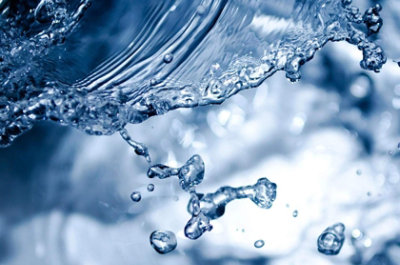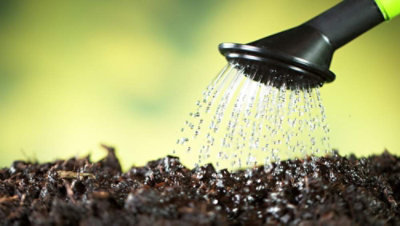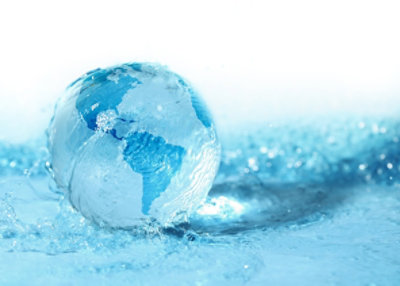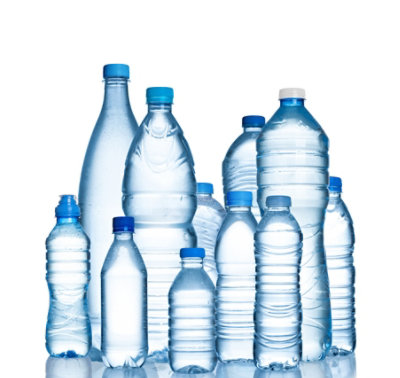- Water Filtration Systems
- Water 101
- The Steps of the Water Cycle and Water Origin
What is Water?

Water, or H2O, is one of the most essential and plentiful compounds on Earth. Existing in gaseous, solid, and liquid states, it is tasteless and odorless at room temperature.
Water has the important ability to dissolve other substances and its versatility as a solvent is one of the qualities that makes it essential to living organisms. Access to cleaner, more reliable water is essential so that humans can thrive. Keep reading to gain an understanding of:
- where water comes from
- how it gets to a home
- how it can impact your family as well as appliances within a household
Where Water Comes from and How it Benefits You
UNDERSTAND HOW WATER GETS TO US AND HOW IT BENEFITS OUR HEALTH
The Hydrological Cycle and Water Distribution
The hydrological cycle, or water cycle, is a continual four-step process whereby water circulates through our environment.
Watch the video below to learn more.
The water we consume and use every day comes from two main sources: groundwater and surface water.
Groundwater
Surface Water

When rain or melting snow seeps into the ground, it collects in underground pockets called aquifers, which store the groundwater. Groundwater usually comes from aquifers through a drilled well or natural spring.
Surface water flows through or collects in streams, rivers, lakes, reservoirs and oceans — not underground like groundwater.
Surface water can be beautiful, even pristine looking, but most of it isn’t directly fit for drinking.

70% of the Earth's surface is water.
3% of our water is freshwater.
1% of that freshwater is usable for humans.

Common uses for water
There are three ways we use water:
Agriculture

water for work

drinking

How do you use water in your home?
We'll focus on water for work and drinking water. Drinking water is the most obvious way we use water daily, but we also use water around our households to complete tasks and keep things running smoothly.
A typical American uses about 82 gallons of water every day. If that sounds like a lot, consider that the total includes not just drinking water, but also the water used for washing, watering lawns and waste disposal.
Types of water delivery
How does water get to you?
Water is delivered to your home one of two ways: through your city or a well. Typically, pipes bring the water supply from a facility that treats the water to your home or business. A well-built and maintained distribution system of pipes helps ensure its quality.
Municipal Water
Well Water

Raw and untreated water is obtained from an underground aquifer (usually through wells) or from a surface water source, like a lake or river.
It is pumped, or flows, to a treatment facility. Once there, the water is pre-treated to remove debris like leaves and silt.
Then, a sequence of treatment processes, including filtration and disinfection with chemicals or physical methods, purifies the water.
When the treatment is complete, water flows out into the community through a network of pipes and pumps that are commonly referred to as the distribution system.
Municipalities sometimes add chlorine to water as a disinfectant, to get rid of certain contaminants.

A well is a strategically placed access point drilled into an aquifer, combined with a pump to withdraw the water and a basic filtering or screening system.
Approximately 15% of the US population relies on individually owned sources of drinking water, such as wells, cisterns, and springs.
The majority of household wells are found in rural areas. Unlike municipal water, water quality from household wells is the responsibility of the homeowner.
We are water Experts
Water quality is non-negotiable. To prove it, we've built state-of-the-art water quality labs and filled them with the best and brightest scientists — all so we can provide you with the best water of your life.

Water Bottles
There has been growing awareness of the impact of water bottles and plastic on the environment, but these are still popular choices for consumers.
Learn additional information about bottled water below.


The source of this water can be a municipal water system or natural spring and from there may go through additional purification.

According to Green.Harvard.edu – bottled water is about 3,000% more expensive per gallon than tap water.

Bottled water generally is no cleaner, safer, or healthier than tap water. In fact, the federal government requires far more rigorous and frequent safety testing and monitoring of municipal drinking water.
Benefits of Filtered water
Water is essential. We need it for our survival.
Filtered water is even better.
Benefits to Health

Water keeps the body performing properly (Harvard Health Publishing, March 2020).
There are physical benefits to energy, organ function, blood pressure, and circulation. Drinking water can:
- Carry nutrients and oxygen to cells
- Protect organs and tissues
- Regulate body temp
- Flush bacteria from the bladder
- Aid in digestion
- Maintain electrolyte (sodium balance)
- Cushion joints
- Stabilize heartbeat and normalize blood pressure.
Benefits to Home

Not only is high-quality water good for you but it is better for your home and appliances too.
High-quality water in your home helps with:
- Appliance longevity
- Maintenance of appliance efficiency
- Flow rate through less build-up
How Does Good Water Benefit Appliances?
Water Heaters
Dishwashers
Faucets and Showerheads
Washing Machines
A study found that when using softened water, units maintained their original factory efficiency rating for 15 years. Running hard water through the unit cut efficiency by 48%.
When run 30 days for 240 cycles, washers using softened water were nearly free of scale buildup. Using softened water keeps up efficiency and protracts the expected longevity of the appliance.
When running hard water through faucets and showerheads, the flow rate is lowered. This is because scale is built up over time.
Another positive to softened water is that your laundry detergent use can be reduced by up to 50% and you can move to colder water without drop in performance.
Source: The Water Quality Research Foundation in conjunction with the Battelle Memorial Institute (2009). “Benefits of Removal of Water Hardness from a Water Supply.”
What's in your water?
start here
Worried about your water? Take control with our at-home water test kit. We'll analyze your water and recommend the best filtration or softening solution for your specific needs.




